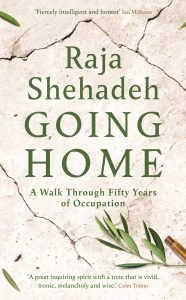A Walk Through Fifty Years of Occupation
By Raja Shehadeh
Profile Books, August 2019, 256 pages, £15
In a note to the reader in Going Home, A Walk Through Fifty Years of Occupation, author Raja Shehadeh writes: “Palestinian Walks, published in 2007, is my account of walking in the Palestinian hills and reflecting on my work and life under occupation. The walks described there took place over a 27-year period. In this book, I describe a walk that I took in the course of one day, June 5, 2017 – the fiftieth anniversary of the occupation – in Ramallah, the city of my birth, trying to come to terms with the political defeats, frustrations, and failures that I have witnessed over the years of occupation and resistance, as well as the changes in the city where I live. I also reflect on ageing as I visit and remember the places, people, and events in my life. All this to be able to arrive home and, in the words of poet Derek Walcott, look in the mirror, greet the face reflected and ‘smile at the other’s welcome.’”
The following is Alex Preston’s review of the book in The Guardian.
“Going Home is a travelogue, a lament, a record of a vanishing city and its near-vanished inhabitants, most of whom (despite World Bank incentives) have fled to the US or Europe. For those who’ve read his earlier books, there is much in Going Home that is familiar. We read of Old Ramallah, of the city’s unique atmosphere, its characters and its gardens, the way Shehadeh’s family came to Ramallah, exiled from glamorous Jaffa during the Naqba – the 1948 expulsion of Palestinians from what was to become Israel. We read of the murder of Shehadeh’s father by a thug who, as a collaborator, was not pursued by the Israeli police. We read of the 2002 siege of Ramallah and Shehadeh’s work with Al-Haq to secure justice for Palestinian prisoners.
“There is partly the sense that this is the traumatic recapitulation of past events, the going over of old ground in the hope of changing, or at least understanding, history. There’s something more subtle at work, though. A decade and a half have passed since those earlier books: the second intifada is a distant memory – Shehadeh remembers it bringing about ‘a great sense of solidarity that I have never forgotten.’ Books are shaped by the context in which they’re written, and both distance and disappointment cast well-known stories in new light. While the early memoirs were written at a time when there was still hope, this latest memoir, which gives the lie to Diogenes’s claim (via Bruce Chatwin) “solvitur ambulando” (“it is solved by walking”), recognises that the history of Palestine is ‘a chronicle of repeated failures. Both we and the Israelis who were against the settlement project have failed to find a way of living together and that’s the biggest tragedy.’
“Legalese is a notoriously ungainly offshoot of the English language, and it is to his great credit that Shehadeh writes prose that is clear, readable and full of powerful imagery. There is no right when it comes to the story of Ramallah and Palestine, but there are many wrongs. It is fitting that it should be a lawyer who writes this book, given that the overwhelming impression for the reader is one of powerlessness and injustice. Shehadeh speaks of the idealism of both Palestinian and Israeli negotiators in the early days post-Oslo, and how this has curdled into bitterness and frustration. ‘By forcing them [the Israelis] to justify the unjustifiable, that which is patently illegal, we have helped them destroy their legal system… We have certainly not won, but neither have they.’”


